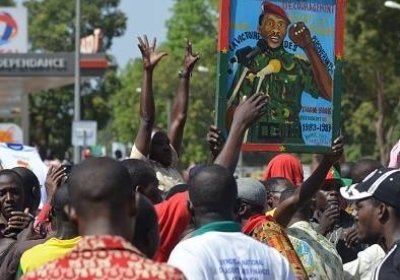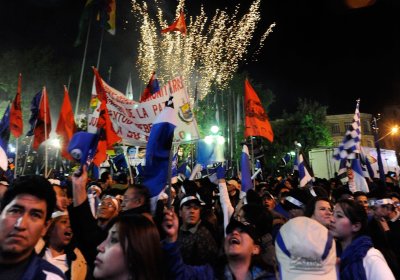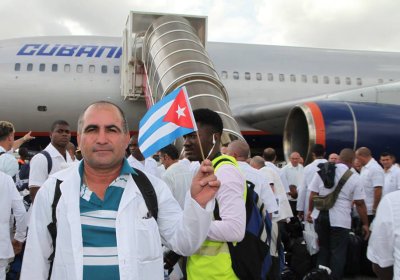Burkina Faso President Blaise Compaore finally stepped down on October 31, ending his 27-year rule and handing over to joint chief of staff General Honore Traore.
Campaore first came to power in a coup that overthrow the revolutionary government headed by Thomas Sankara, which was leading a profound transformation of the west African nation.
The president was forced out of office by a burst of violent protests in which parliament was set ablaze. Protesters refused to accept anything short of his immediate resignation.
1030
Predictions by pollsters and commentators that Evo Morales would easily win Bolivia’s October 12 presidential elections were confirmed when he obtained more than 60% of the vote.
Most, however, differ over why, after almost a decade in power, Morales’ Movement Towards Socialism (MAS) continues to command such a huge level of support.
Their explanations tend to focus on specific economic or political factors, such as booming raw material prices or the MAS’s ability to control and co-opt the country’s social movements.
About 150 people rallied outside the Ferguson Police Department on October 22 to demanding justice for the murdered unarmed Black teenager Michael Brown, and the arrest of the police officer who shot him, Darren Wilson.
Part of the National Day of Protest Against Police Brutality, similar protests were held in Sacramento, San Francisco, New York, among others.
The protests were organised by the Ferguson October movement, an African American-led movement demanding a halt to police vience against Black people.
A deranged gunman, Michael Zehab-Bibeau, shot dead a soldier at the Canadian war memorial in Ottawa before being shot dead while trying to storm parliament on October 22. The motive for the actions, if there was a clear one, remains unknown.
The attack came two days after two Canadian soldiers were hit by a car in Quebec. The car was driven by Martin Couture-Rouleau, a 25-year-old Canadian who had recently converted to Islam. One of the soldiers died, as did Couture-Rouleau when he was shot by police upon apprehension after allegedly brandishing a large knife.
Thai dictator Prayuth Chan-ocha has told reporters not to “speculate” when elections would be held again in Thailand. Many analysts are predicting that elections will not take place until at least 2016 ― rubbishing the initial promises of the military junta that seized power in May to hold elections next year.
Meanwhile a panel of anti-reformist junta lackeys were pontificating about the legacy of the October 14, 1973 uprising against the military and how this would “influence” the present anti-reform process.
Malala Yousafzai, the 17-year-old Pakistani activist, has won a well-deserved Nobel Peace Prize, putting her and her amazing, tragic story back in the spotlight.
But as usual, the corporate media have taken this positive development and exploited it in the service of US imperialism.
The corporate media love talking about Malala's remarkable bravery and strength in standing up for girls' rights to education ― and highlight the brutality of the Taliban forces that tried to assassinate her on her school bus.
The Court of Justice of the European Union has annulled the EU’s ban on the Liberation Tigers of Tamil Eelam.
The ban was imposed in 2006. The Council of the EU claimed that the LTTE, which had waged an armed struggle for an independent Tamil homeland against the Sri Lankan state, was a terrorist organisation.
After its military defeat in May 2009, the LTTE no longer exists in its original form of an armed independence movement. However, the continued ban on the LTTE has restricted the peaceful political activities of Tamils campaigning for human rights and national self-determination.
As with all advertisements, there are a few deceptions at the heart of Apple's commercial for U2's newly released Songs of Innocence. The most immediate is that it ends with the tagline “free on iTunes now”.
Given that the album was delivered ― without permission ― into the digital libraries of over 500 million iTunes users, implying any kind of choice in the matter seems at the very least misleading. A better version of the ad might read “yours whether you like it or not”.
Thousands of Venezuelan youth and supporters of the United Socialist Party of Venezuela (PSUV) government took part in a march on October 18 against terrorism and for peace.
The youth march was organised in response to the assassination of Robert Serra, a 27-year-old PSUV parliamentarian and Chavista. Serra was murdered along with his partner Maria Herrera in their home on October 1.
The demonstrators filled the streets of Caracas to take their demand ― that lawmakers officially declare the murder of Serra as an act of terrorism ― to the National Assembly.
Thousands of students protested in the Mexican city of Guadalajara on October 22 to demand justice and a clear investigation into the death of an engineering student who was arrested by municipal police, only to be found dead hours later.
The corpse of Ricardo Jesus Esparza Villegas was found on the morning of October 19 in an alley outside a private home in the historic city of Guanajuato. According to information provided by the municipal government, the student was killed “by a sharp blow to the skull”.
However extra information from the authorities has yet to be made public.
At the same time as the United States government has responded to the Ebola crisis in west Africa by sending soldiers ― and the Australian government by refusing to send any medical personnel at all ― Cuba has sent 460 medical personnel to affected countries. In his regular column, reprinted from the Cuban News Agency, former Cuban president Fidel Castro explained Cuba's response.
***
Left Unity is a new political group in Britain created out of a call last year by filmmaker Ken Loach for a new party to the left of Labour, which has moved rightwards in recent years and supports anti-worker austerity measures. The call was supported by thousands of people and Left Unity held its founding conference in November last year.
Green Left Weekly's Denis Rogatyuk spoke with Left Unity's national secretary Kate Hudson, a veteran campaigner who is also general secretary of the campaign for Nuclear Disarmament.
- Page 1
- Next page







